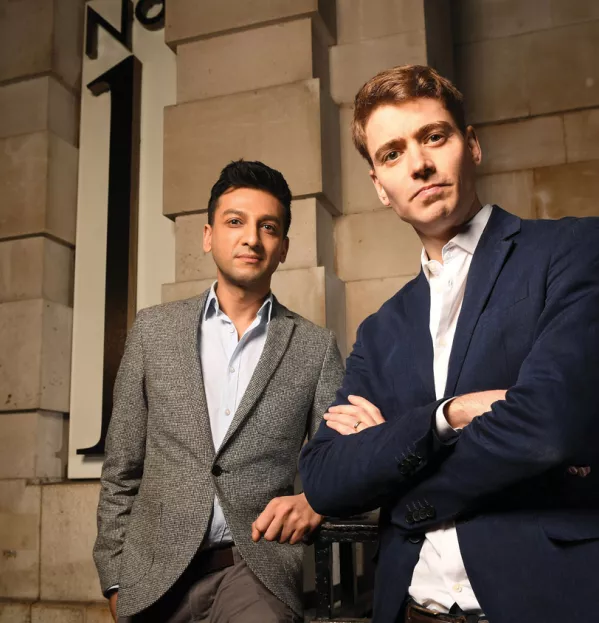Euan Blair: ‘I want to save the day in apprenticeships’

After spending his teenage years living behind the most famous front door in the country, Euan Blair has tended to shy away from the public eye.
But if you believe what you read in the gossip columns, the eldest son of Tony Blair is simply biding his time before following in his father’s footsteps and launching an inevitable bid to become an MP.
Speaking to TES in his first media interview, however, Blair stresses that this couldn’t be further from the truth. “None of that’s ever come from me,” he says.
Rather than politics, it is the world of apprenticeships that Blair has gravitated towards. Earlier this year, the 32-year-old founded WhiteHat. As well as directly delivering apprenticeships, the company acts as a matchmaker, signing up students with strong academic grades and pairing them up with companies looking to bolster their recruitment away from the usual graduate market.
WhiteHat, run by Blair and chief commercial officer Ash Ahmad, is thinking big and aims to capitalise on two recent policy initiatives: the introduction of the apprenticeship levy and the government’s drive to promote degree apprenticeships as an alternative to university.
The firm’s Twitter account boldly proclaims that it offers the “Ivy League of apprenticeships”. Blair’s ambition, he says, is to “transform post-16 education”. After spending most of his adult life being at pains to stay under the radar, he has now found a sector where he’s quite prepared to ruffle a few feathers.
Hence the company’s name. In westerns, Blair explains, the “white hat” was traditionally “the hero of the piece”. “We very much see ourselves as trying to save the day in apprenticeships,” he adds. “That mission element is very important to us.”
‘Education is a passion’
In contrast to Blair’s zeal for apprenticeships, his own education was along traditionally academic lines. After attending the London Oratory School - his father, then prime minister, choosing the highly selective Catholic state school caused significant controversy - he studied ancient history at the University of Bristol, before taking a masters in international relations at Yale University in the US.
Following a political internship in Washington DC, Blair joined the investment banking graduate programme at Morgan Stanley in 2008 - weeks before the global financial crisis engulfed the financial sector.
Apprenticeships can’t just be seen as the option for kids who aren’t that academic
“My boss was fired within a few weeks of me joining,” he recalls. “Suddenly, thousands of desks - a third to a half of them - were empty. “It was a slightly terrifying environment to join. But you learn a huge amount. It meant you got a lot more exposure and responsibility, so there were opportunities.”
But Blair quickly realised that this wasn’t the right job for him. “I found it really interesting, but I didn’t love it. So I wanted to do something more socially motivated and aligned to policy areas I was really interested in: employment and education.”

Blair’s next role was at welfare-to-work provider Sarino Russo Job Access, where he quickly rose to the role of CEO of its UK operations. Having spent much of his life in the presence of political and business heavyweights, Blair now found himself working with the long-term unemployed in Midlands towns such as Kidderminster, Nuneaton and Rugby.
“I was meeting people who had been unemployed for 12 months or more,” he says. “These were not easy people to get into jobs. We did that incredibly well.”
The role whetted Blair’s passion for training and employment. And further inspiration came from the announcement of the apprenticeship levy by then chancellor George Osborne in November 2015.
But as much as Blair was excited by the levy’s potential, he felt that something was missing. “It was clear that employers weren’t overly enthusiastic about what they were being offered,” he recalls. He felt compelled to act.
WhiteHat was incorporated on 26 February 2016. Shortly afterwards, Blair met recruitment technology expert Ahmad, who shared his belief in the power of technology to drive the apprenticeship agenda. The pair instantly hit it off; by August, Ahmad had become WhiteHat’s CCO.
Ahmad’s educational background is closer to that of the young people WhiteHat is seeking to attract. “I wasn’t academic. I was quite the opposite to Euan,” he says. “I wanted to work. But, because I got good grades, my parents were like, ‘No, you’re going to university’.”
Ahmad ended up on an IT graduate scheme, working with banks and picking up expertise as a developer, before moving into business development. He went on to work on European Social Fund projects, and producing labour market data for colleges with an ed-tech firm. This was where he first came across the FE sector.
Both Ahmad and Blair believe that the levy offers major opportunities for employers and providers alike. “It’s a blunt instrument,” Blair concedes, “but the government has found a way to compel employers to actually engage directly with kids coming out of school, because it has financial consequences.”
Connecting with employers
But employers need to be confident that apprenticeships can produce high-calibre recruits on a par with established graduate schemes - otherwise, they could end up writing off the levy payment as a tax and not investing in apprentices, Blair fears.
Accordingly, WhiteHat serves as a middleman, aiming to connect young people who have strong exam grades with leading businesses in the law, accounting, IT and digital media sectors.
It already has more than 5,000 young people aged between 16 and 23 on its books. Of these, almost two-thirds are aged 16-18 - the demographic that has the lowest take-up of apprenticeships. And around 80 per cent of them have achieved the benchmark of five A*-C passes, including English and maths.
This is going to be a battle - you can’t change things overnight
“If [apprenticeships are] going to be taken seriously, they can’t just be seen as the option for kids who aren’t that academically bright, who were never going to go to university anyway,” Blair says. “We want a situation where smart kids, who could go to Oxbridge or Russell Group universities, have to make a difficult decision: ‘Do I go down that route, or do I join this incredible apprenticeship scheme at a top UK corporate or really exciting tech start-up?’”
In some cases, WhiteHat advises employers not to use the word “apprenticeship” at all, he adds. “We’re telling them: don’t make [apprentices] a special class of employee. Try and integrate them into, say, your existing graduate scheme. In some cases, don’t even brand them as apprenticeships. Make it part of a broader early careers programme.
“Give them the same kind of benefits, give them the same kind of employment contract, similar terms, pay them a similar level, because then you’ve not got that distinction and stigma.”
Graduate roles are often just as likely to involve “photocopying and making tea”, Ahmad adds. “This is an important message to get out there to the parents, the teachers and the employers: just because you have got a degree, it doesn’t mean that you should be treated differently from someone who hasn’t.”
Blair nods. “It would be a massive disappointment if, post levy, we found employers rebadging existing graduate schemes, taking on the same people from the same universities and figuring out a way to kind of game the system. That’s going to be a problem.”
Unleashing the tech
WhiteHat is funded by Global University Systems, a multinational education provider which currently boasts 40,000 students at its specialist institutions across the world.
But the new company has started small deliberately. Six months in, it has 18 employees on its books and is delivering around 70 apprenticeships in London and the South East.
Plans for national expansion are afoot, however. Clients include tech firm Dyson, real-estate agents Foxtons, media company UKTV and investment bank Nomura. It is also working with multi-academy trusts, such as the Harris Federation and Ark, developing apprenticeships for teaching assistants and teachers.
And rather than targeting employers that have already established apprenticeship programmes, WhiteHat is focusing on those put off by the bureaucracy associated with apprenticeship delivery.
The prospect of being inspected by Ofsted is often perceived as a barrier for employers. And with good reason: as of August, almost a third of the employer providers inspected had been graded “inadequate” or “requires improvement”. “Inspectors continued to find that employers do not know enough about the requirements of an apprenticeship, and do not provide enough off-the-job training to ensure that apprentices develop the skills they need,” Ofsted’s annual report states.
While Blair insists that robust monitoring is essential to ensure that public money is being spent appropriately, he argues that a more responsive, tech-based approach to regulation is overdue: “You can record huge amounts of information on someone’s smartphone, and it’s verifiable and can tick all the boxes.”
Similarly, Ahmad says that the FE sector has “missed a trick” by not capitalising on the potential offered by technology - particularly in using social media that is popular with young people (such as Snapchat, Instagram and WhatsApp) rather than with their parents (such as Facebook and LinkedIn).
WhiteHat is also seeking to use social media to build apprentice networks as an alternative to well-established university alumni associations - an approach, Ahmad, adds, which he feels the FE sector has singularly failed to grasp: “Just because you haven’t gone to university, it doesn’t mean you shouldn’t have access to a peer group. The sector hasn’t actually put anything in place for that.”
The passion the pair share for boosting the profile and prestige of apprenticeships is plain to see. And Blair insists that he has no plans to abort this mission so he can move into politics any time soon. “The aim is here, right,” he says, tapping the table for emphasis, “to transform post-16 education, and to do that in a way we feel is really effective. Now, we see this as a long-term plan. There’s nothing else in the pipeline; no plans to do anything else.
“This is going to be a battle. It is, because the fact is the brand of apprenticeships isn’t where it needs to be; be it with schools, be it with employers, be it with parents. You can’t change that overnight.”
Stephen Exley is FE editor at TES. He tweets @stephenexley
You need a Tes subscription to read this article
Subscribe now to read this article and get other subscriber-only content:
- Unlimited access to all Tes magazine content
- Exclusive subscriber-only stories
- Award-winning email newsletters
Already a subscriber? Log in
You need a subscription to read this article
Subscribe now to read this article and get other subscriber-only content, including:
- Unlimited access to all Tes magazine content
- Exclusive subscriber-only stories
- Award-winning email newsletters